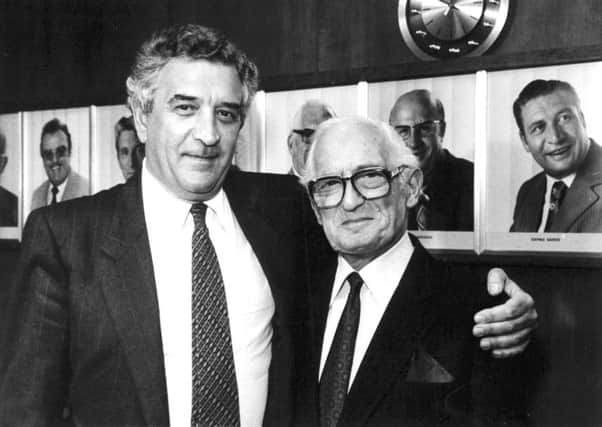Silver, the man who turned Leeds into champions


Hooliganism was rife, the team was struggling on the field and the financial coffers were bare.
From such an inauspicious start, Silver – with the help of several key figures along the way – dragged Leeds back from the abyss and on to the League Championship.
Advertisement
Hide AdAdvertisement
Hide AdUnited’s revival was achieved with the customary good grace, integrity and steely business sense that had characterised the life of a man who turned a £1,000 wartime gratuity into one of Britain’s best known firms.
Born in London, he joined the RAF at the age of 17 in 1943 and served his country during the Second World War with such distinction that he was awarded the ‘Bomber Command Clasp’ in recognition of the 40-plus operations he took part in over Europe and a further 20 in the Far East.
On being demobbed at 22, Silver founded Silver Paint and Lacquer Company Limited to set in motion a business career that would, a year before taking on the chairman’s role at Elland Road, see him awarded the OBE for services to export.
By the time Silver retired from the business world in 1991, his company – by now called the Kalon Group – boasted a turnover of around £100m. He later went on to serve as chancellor of Leeds Polytechnic and its successor, Leeds Metropolitan University. A building on the campus of what is now Leeds Beckett University is named after him.
Advertisement
Hide AdAdvertisement
Hide AdIt is, however, for the key role Silver played in taking Leeds United from the depths of despair to the very top of the English game that he will be best remembered in the city.
Silver, born in London and a supporter of Arsenal as a youngster, had been on the board for only a short time when he stepped up from vice chairman to chairman in December, 1983.
Straight away, he set to work on tackling United’s two main problems – the hooligans and a lack of money.
An identity card scheme was introduced in an attempt to root out troublemakers who were testing the patience of the Football Association with each incident of disorder.
Advertisement
Hide AdAdvertisement
Hide AdAway games also became all-ticket, while other steps were taken to try to reshape United’s image as a family club.
Finance-wise, the sale of Elland Road to Leeds City Council generated much-needed funds and, gradually, the club started to be turned round.
Tough – and often unpopular – decisions were also taken, as Eddie Gray was sacked as manager. Billy Bremner, too, after the Scot had been unable to build on the 1986-87 season that had seen Leeds lose both the Division Two play-off final and get knocked out of the FA Cup in the semi-finals.
Enter Howard Wilkinson. Bobby Robson, then the England manager, had recommended Sheffield Wednesday chief Wilkinson, but lesser men than Silver and managing director Bill Fotherby might have baulked at the thought.
Advertisement
Hide AdAdvertisement
Hide AdNot only were the Owls a division above Leeds but they seemed a much better bet in terms of bringing the major honours to Yorkshire. Why would Wilkinson swap Wednesday, seventh in the top flight, for a club sitting fourth bottom of the second tier?
Two weeks of talks later, however, and Leeds had finally got their man after both parties had convinced the other of their ambition and vision.
In his first full season, ‘Sergeant Wilko’ – as he was affectionately dubbed by the Elland Road fans – led United out of the Second Division as champions.
The calculated gamble by Silver to release the funds to bring in Gordon Strachan, Mel Sterland, Vinnie Jones, Chris Fairclough and Lee Chapman had paid off handsomely.
Advertisement
Hide AdAdvertisement
Hide AdPromotion, though, was just the beginning, as Wilkinson was handed further funds to bring in Gary McAllister and John Lukic. A fourth place finish followed before Silver sanctioned a further round of spending to bring in Rod Wallace and Tony Dorigo.
The final pieces of the jigsaw were in place. On April 26, 1992, Leeds, after beating Sheffield United and then watching rivals Manchester United lose at Liverpool, were crowned champions for the third time in their history.
Further success on the field may have eluded United. But, by the time Silver stepped down at the age of 71 in 1996, the legacy of his reign could be seen not only in that 1992 League Championship but also Elland Road, which had been transformed into one of the best stadiums in the country.
He retained close links with the club, pledging £15,000 to the cost of the statue of Don Revie that now stands opposite the East Stand. It was through his appreciation of Revie that I was fortunate enough to be invited to the Silvers’ home a few years ago.
Advertisement
Hide AdAdvertisement
Hide AdAt the time, I was putting together a biography with Revie’s family, and Leslie’s second wife, Sheila, had been a great friend of the former Leeds manager and his wife Elsie.
A hugely enjoyable couple of hours followed, as I was regaled with tales of what the Revies had been like away from the public glare. It was great fun and, I was later informed by former colleagues who knew the Silvers well, typical of the couple’s generosity. RIP Leslie Silver.